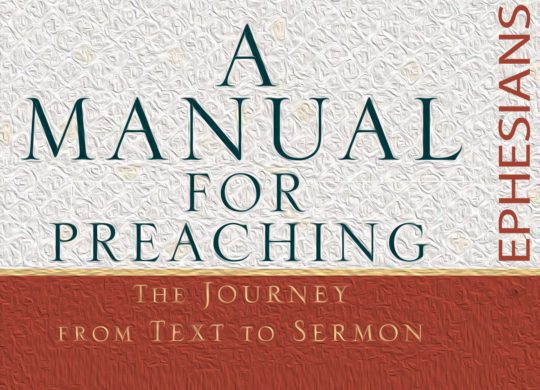Ephesians 1:15–23

This pericope is essentially a prayer by Paul. At the onset, he asks that the Ephesians might know three things: the hope to which God has called them, the glorious inheritance that God possesses in them, and the great power of God working for them (Eph 1:18–19). The first two—hope of divine calling and glory of divine inheritance—have already been dealt with in 1:1–14 (as part of the magnificent privilege of believers incorporated into God’s grand plan to consummate all things in Christ: 1:4, 5, 11, 12; and 1:11, 14, respectively). Here the last element, power, that stands out, separated from the first two with an “and.” The topic of power takes most of the space in 1:15–23. There is also a shift in this pericope to the use of a first-person plural pronoun in 1:19. This indicates that all believers, including Paul himself, benefit from the working of God’s incredible power.
All believers. Experiencing the power of God.
Also notice that several of the NT words that indicate “power” show up in 1:19 (dynamis, energeia, kratos, ischys, “power,” “working,” “strength,” and “might,” respectively), emphasizing the incomparability and all-encompassing nature of divine power. The potency of Paul’s description is evident in his use in 1:19 of the participle of hyperballō (“surpassing,” used only five times in the NT) and the noun megethos (“greatness,” employed only here in the NT). So “power” is integral to the thrust of this pericope.
All believers. Experiencing the incredible power of God.
But why? Why launch into this declamation on power? And why here?
Some background information is helpful here. These early Christians in Ephesus lived among pagans who believed in a plentitude of supernatural entities. Set against this background, Paul’s declaration here is a strong word of comfort as it emphasizes the supremacy of God’s power over every other kind of power. Ephesians 1:21 also balances the four synonyms of divine power in 1:19 by labeling four entities of hostile power: archē, exousia, dynamis, kyriotēs, “rule,” “authority,” “power,” and “dominion,” respectively. Thus, the listing of four hostile powers in 1:21 is likely intended to be a contrast to the four specifications of divine power in 1:19.
All believers. Experiencing the incredible power of God. Hostile powers at work.
Now we are getting closer. The first pericope focused on God’s grand plan to consummate “all things in the heavens and on earth” in Christ, co-opting humans into that glorious scheme. This divine enterprise is going to meet with some significant pushback from certain denizens “in the heavens” who are inimical to God and antithetical to all he is doing. Great plan, grand scheme, no doubt. But guess what? Great will also be the opposition, and that opposition will be directed towards us who have been incorporated into God’s plan.
All believers. Experiencing the incredible power of God. Hostile powers at work to oppose God’s plan and God’s people.
But divine power is far greater than any other power of any other being anywhere in the universe. God demonstrated the magnificence of his might in the resurrection of Christ and his exaltation in heaven, thereby subjugating all hostile powers under Christ’s feet and giving him as head to the church (1:20–22). In terms of time, then, the scope of Christ’s reign is eternal: “not only in this age but also in the one to come” (1:21b). In terms of space, Christ is seated “at his [God’s] right hand,” “in the heavenlies,” and “far above” every other conceivable power (1:20b–21a). Thus, both space and time are encompassed in this depiction: divine power in Christ overrides every opposing power in the universe as he subjugates them all under his feet forever.
All believers. Experiencing the incredible power of God. Hostile powers at work to oppose God’s plan and God’s people are overwhelmed by God’s incredible power in and through Christ.
This same incredible power that God “worked in Christ” (1:20) is at work for believers—“for us who believe” (1:19). Thereby, every antagonistic power is subject not only to Christ but also to his body, the church (1:22)—another facet of the saints’ marvelously privileged position! In this sense, the church is more powerful (in Christ) than every other anti-God power. (This makes good sense. Every other lesser power has been subdued “under his [Christ’s] feet” (1:22). So if believers are “his body” (1:23), then all those powers are under believers’ feet as well.)
Hostile powers at work to oppose God’s plan and God’s people are overwhelmed by God’s incredible power in and through Christ—power that is extended towards believers.
It is very likely that the idea of “fullness” (plērōma, 1:23) in Ephesians refracts the OT concept of divine presence, akin to God’s shekinah glory. In the OT, God filled the sanctuary; now in Christ, he fills the church that thereby partakes of divine fullness. Christians are truly empowered beings in Christ. We have nothing to fear, as God involves us in his grand and glorious plan to consummate all things in Christ.
Hostile powers at work to oppose God’s plan and God’s people are overwhelmed by God’s incredible power in and through Christ—power that is extended towards believers, the body of Christ, his fullness, as Christ reigns.
Here’s a more convenient label (or shorthand, title, or handle) for pericopal theology:
As the fullness and body of Christ, the church manifests God’s incomparable power against supernatural foes.












 Abe Kuruvilla is the Carl E. Bates Professor of Christian Preaching at The Southern Baptist Theological Seminary (Louisville, KY), and a dermatologist in private practice. His passion is to explore, explain, and exemplify preaching.
Abe Kuruvilla is the Carl E. Bates Professor of Christian Preaching at The Southern Baptist Theological Seminary (Louisville, KY), and a dermatologist in private practice. His passion is to explore, explain, and exemplify preaching.